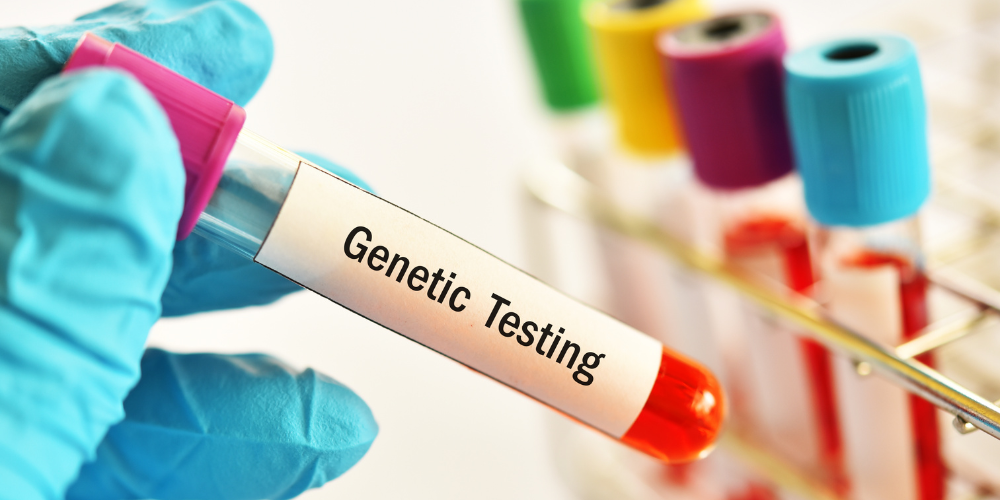
Genetic Testing
Use your genetic information to optimise your health and prevent the risk of chronic conditions.
Genetic testing is the process of analysing an individual’s DNA to identify specific genetic variations that may be associated with certain health conditions or traits. Genetic testing can be used for a variety of purposes, such as identifying genetic disorders, assessing the risk of developing certain conditions, and determining the most effective treatment options.
Gut Philosophy offers genetic testing packages that analyse only a specific set of clinically relevant genetic variants (called Single Nucleotide Polymorphisms or SNPs) involved in key biochemical functions and pathways, such as:
- Nutrient sensing
- Metabolism
- Methylation
- Nervous System and Neurotransmitters
- Detoxification
- Hormonal regulation
- Oestrogen balance
- Histamine Intolerance
How does this type of genetic testing differ from other genetic tests?
There are a wide variety of genetic tests available on the market starting from ancestry to medical diagnostic testing looking to determine the risk of developing of specific genetic disorder or condition.
Gut Philosophy offers genetic analysis focusing only on a specific subset of genetic variants that are clinically relevant and actionable. This means, that once you know your genetic predispositions you would be able to support any identified risks with personalised nutritional and lifestyle strategies. The genetic information may also provide additional insights into pre-existing conditions or symptoms.
What is Genetic testing for?
- Prevention – your genetic information would allow you to understand nutritional and lifestyle priorities in order to reduce the risks of developing chronic conditions.
- Pre-existing chronic conditions – for people suffering from chronic health conditions who are looking to understand if genetics plays a role and how to support specific pathways contributing to symptoms.
- Health optimisation & biohacking – for people looking to optimise their health and well-being using genetic insights.
- Non-responders – people who are not responding to clinical interventions would benefit from genetic analysis to understand if there is a strong genetic component in their condition and symptoms.
Types of genetic reports available
Each genetic report provides personalised, colour-coded genotype results, gene function and SNP impact descriptions, clinically relevant SNPs, nutrient and other epigenetic impacts, and links to research evidence.
There are 11 reports available:
- Nutrients Core Report (Check Sample Report)
- Metabolics Report (Check Sample Report)
- Detoxification Report (Check Sample Report)
- Methylation Report (Check Sample Report)
- Hormones Report (Check Sample Report)
- Oestrogen Balance Report (Check Sample Report)
- Nervous System Report (Check Sample Report)
- APOE Report (Check Sample Report)
- Thyroid Balance Report (Check Sample Report)
- Athlete Report (Check Sample Report)
- Histamine Intolerance Report (Check Sample Report)
It is recommended to start your genetic optimisation journey with at least two reports. Please see the FAQs below for conditions and symptoms covered in each report.
What is included in a Genetic Testing package?
The investment for the Genetic Testing packages is as follows:
- One genetic report: £495
- Two genetic reports: £675
- Three genetic reports: £845
- Five genetic reports: £1,295
Book a discovery call to discuss the types of genetic reports suitable for you.

Genetic Testing FAQs
Genetic testing is the process of analysing an individual’s DNA to identify specific genetic variations that may be associated with certain health conditions or traits.
Will the report explain or predict health issues or diseases?
This genetic testing analyses common variants (SNPs) that have the potential to alter gene expression and impact health. The report will include nutrition and lifestyle advice on how to compensate for potential SNP impacts and manage the associated risk.
- Food response (gluten, lactose, caffeine, microbiome diversity)
- Vitamin need (vitamin A, vitamin B9 (folate), vitamin B12, vitamin C, vitamin D, vitamin K, glutathione)
- Metabolism (sugar & fat, appetite, inflammation, blood pressure, circadian rhythm)
- Appetite dysregulation (under/overeating, emotional/binge eating, food addictions/cravings, weight gain, obesity)
- Nutrient sensing (longevity/ageing, DNA damage, slow metabolism)
- Blood sugar imbalance (insulin resistance, diabetes)
- Fat metabolism (fat storage vs burning, high BMI/weight gain, stubborn obesity, preference for high-fat foods)
- Optimising & personalising diet (ketogenic diet, paleo diet, high protein diet)
- Digestive & liver detox issues (bile production, fat digestion, NAFLD
- Mitochondrial damage (oxidative stress, inflammation)
- Energy (low energy/fatigue, CFS, long Covid, sports performance)
- Cardiovascular disease (raised triglycerides, cholesterol imbalance)
- Optimising cognitive function (brain fog, neurodegenerative conditions)
- Gastro-intestinal tract issues (digestive issues, bad breath, bloating, bad hangovers, intolerance to fatty foods, constipation, diarrhoea, bitter taste, swollen liver, gallbladder problems)
- Immune system (skin – scratching, itching, facial flushing, urticaria, dermatitis, rhinitis, asthma, recurrent infections, food allergies)
- Other (pharmaceutical drugs side effects, infertility, PMS, weight gain, depression, anxiety/mood swings, headaches, dementia, poor memory & concentration, neuralgia, muscle aches & weakness, arthritis, sensitivity to chemicals & odours, chronic fatigue/lethargy, anaemia, premature ageing, lung, bladder, breast and pancreas cancers, atherosclerosis, Parkinson’s Disease)
Fertility issues, neural tube defects, miscarriages, pregnancy issues, fatigue, cardiovascular disorders, allergies, anxiety, cancer, and autism.
YInfertility, low libido and sex drive, low sperm count, acne, excess facial hair in women, PCOS, PMS, PMDD, blood clots, mood swings, depression, substance misuse, poor memory, weight gain (belly fat for men), breast appearances in men, hormone-sensitive cancers – breast cancer/prostate cancer
- Mental health disorders (anxiety/worry, depression, general or social anxiety disorders or phobias, panic attacks or disorders, bipolar disorder, ADHD, PTSD, obsessive-compulsive disorder (OCD), obsessive behaviour (adrenaline), psychosis, addiction)
- Mood (irritability or restlessness/agitation, low mood, mood disorders (SAD, bipolar disorder, major depressive disorder), anger or violent behaviour, lack of motivation – decreased drive and motivation, lethargy, dizziness, decreased libido)
- Appetite (appetite, hunger or cravings, weight gain, anorexia nervosa
- Sleep (insomnia/sleep disturbances, obstructive sleep apnea, excessive need for sleep, poor attention and lack of focus, fatigue / chronic fatigue)
- Gastro-intestinal issues (constipation, gut sensitivity or diarrhoea, nausea)
- Pain (increased pain sensitivity, chronic pain, joint pain, migraines/headaches
- Neurodegenerative (seizures or convulsions, muscle tremors or spasms, motor control disruption, Alzheimer’s disease, Parkinson’s disease (resting tremor)
- Other (pyroluria, hyperthyroidism, hyperglycaemia and hyperinsulinemia, high blood pressure or hypotension, bone loss, orthostatic intolerance, carcinoid syndrome)
Increased plasma cholesterol, Alzheimer’s disease, susceptibility to cardiovascular disease – heart attack/stroke due to atherosclerosis.
- Hypothyroidism (weight gain, fatigue, low libido, cold intolerance, dry skin, constipation, depression)
- Hyperthyroidism (anxiety, heat intolerance, heart palpitations, insomnia, weight loss)
- Train (cardio-vascular adaption, strategic fuelling, structural strength)
- Recover (resilience, inflammation, oxidative stress, sleep)
- Perform (stress, stimulation)
- Skin (redness, itchiness, rash, eczema, hives)
- Respiratory (runny nose, broncho-constriction, asthma, chronic cough, nasal congestion)
- GI tract issues (stomach acid reflux, diarrhoea, nausea/vomiting
- Vascular (vasodilatation, low blood pressure, dizziness, fainting, rapid heartbeat, oedema, migraine/headaches)
- Neurological (insomnia, anxiety, memory issues, concentration problems, ADHD)
Fibroids, PMS, endometriosis, heavy menstrual bleeding, oestrogen-related skin issues – acne, rashes, ER positive breast cancer.
This testing uses a saliva sample obtained through a cheek swab. The lab kit is delivered to your home address, you obtain a saliva sample following the instructions included and post the sample to the lab for analysis.
Genetic testing is appropriate for anyone looking to understand certain predispositions and risks of developing chronic conditions, and develop a personalised nutritional and lifestyle strategy.
The results of the genetic testing are usually available within 2-3 weeks of the lab receiving the sample. Your functional medicine practitioner will be in touch to arrange your interpretation consultation once the results are available.
It depends on your insurance provider. Some genetic testing may be covered by insurance, but it is important to check with your insurance provider to confirm the coverage.

Testimonials
What My Happy Clients Say!
“Elena has inspired me to start my health optimisation journey. She has done several functional tests for me (microbiome etc) and helped identify and treat a few issues they showed. It transpired I had candida (which explained some issues I had for years) and through following Elena’s advice, this has been sorted.
She has also tweaked my diet, encouraging me to include food groups I used to ignore and making sure my morning smoothies were balanced, teaching me optimum nutrition for better health. She has also given me advice on sleep, stress management, and weight loss. I have now lost 6kg following Elena’s recommendations and have never felt better.”

